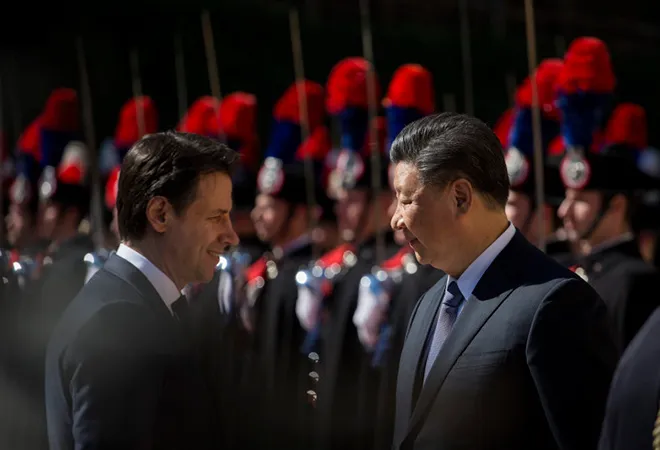-
CENTRES
Progammes & Centres
Location

Italy’s government provoked a new controversy in Europe when it recently signed up as the first developed economy to China’s Belt and Road Initiative (BRI). A total of 29 deals amounting to 2,5 billion Euro were agreed-upon during Chinese President Xi Jinping’s visit to Rome in March 2019.
Italy’s allies in the EU and the United States have expressed concern about the move. Even former Italian Prime Minister Paolo Gentiloni called the decision to join Beijing’s global infrastructure investment programme “unwise” although he admitted that, “the agreements signed in Italy are not so relevant from an economic point of view”.
More worrying seems the fact that Italy’s move comes at a time when Europe is slowly waking up to China’s increasing political role and assertiveness on the global stage. As the European Commission and the High Representative for Foreign Affairs have formulated in their “EU-China Strategic Outlook” from 12 March 2019: “There is a growing appreciation in Europe that the balance of challenges and opportunities presented by China has shifted.” In fact, Europe has come to see China as a competitor, both economically and politically.
Recalibrating the existing strategic partnership with China in a manner that creates a level playing field for European and Chinese companies and avoids breaking-up over controversial political issues such as human rights is not easy.
Recalibrating the existing strategic partnership with China in a manner that creates a level playing field for European and Chinese companies and avoids breaking-up over controversial political issues such as human rights is not easy. In this atmosphere, solo-runs by member states like Italy are problematic but not at all surprising. During China’s long ascent, many EU members have built their very own networks with the country, especially the larger ones.
For example, Germany holds regular government consultations with China. The country has been for Berlin the most important trading partner worldwide. In 2018, both countries exchanged goods and services worth 200 billion Euro. Under these circumstances, it is hard to criticize smaller economies if they, too hope for a slice of the Chinese cake even if they don’t have the same access to the government in Beijing as larger countries.
As a result, the 16+1 format was created that includes 11 smaller EU member states, 5 Balkan countries (Albania, Bosnia and Herzegovina, Bulgaria, Croatia, the Czech Republic, Estonia, Hungary, Latvia, Lithuania, Macedonia, Montenegro, Poland, Romania, Serbia, Slovakia, Slovenia) and China in order to foster economic cooperation.
This has raised eyebrows in Brussels not only over the fear that the giant China could swallow-up important economic assets in these smaller countries and thus gain unwelcomed strategic influence in Europe. A point in case is Greece, where China acquired a majority share in the largest port of the country, Piraeus. Many in Brussels fear that China consciously tries to divide Europe. The liberal parliamentarian Guy Verhofstadt warns of a “divide-and-conquer tactics”.
But it would be too easy to put the blame on Italy or the 11 members of the 16+1 format alone. All of Europe was uncritically mesmerized by the Chinese growth story and its economic opportunities in the past. The collective belief that China would automatically turn into a Western-style democracy when it becomes rich, seems extremely naïve in hindsight. It is therefore time that Europe learns a bit of Tai Chi or the art of fighting without a fight or even winning when it comes to China. That also includes not losing its cool.
While the Italian coalition government seems rather divided over the question how to handle China, the public discourse in Italy is less than enthusiastic about the prospect to become “the next Africa or Greece”( meaning a victim of China’s new credit-imperialism). It is therefore unclear what direction Italy’s partnership with China will take in the medium and long-term or after the elections to the European Parliament later this year.
Since China needs European markets as a buyer and endpoint of its many silk roads, there is no reason for trepidation. Europe is not the proverbial rabbit in front of the snake, although it sometimes seems to feel so.
Since China needs European markets as a buyer and endpoint of its many silk roads, there is no reason for trepidation. Europe is not the proverbial rabbit in front of the snake, although it sometimes seems to feel so. Individual member states can have bilateral relations with China as long as Europe creates mechanisms to coordinate on vital questions such as security and sovereignty. Europe needs to protect its critical infrastructure and make sure that European firms get the same opportunities and market access in China as Chinese firms do in Europe.
The challenge that China poses is also an opportunity for the EU to develop new mechanisms of cooperation within a framework that does not necessarily need “full unity”, as the Commission and the High Representative claim in their strategic outlook on China. Maximalist demands have lead the EU more than once into impasses that it can ill afford. Member states that have been profiting for a long time from the gigantic Chinese market should help others to get onboard.
The different histories and interests in member states vis-à-vis China can well be used to Europe’s advantage as long as member states remain in a dialogue with each other and do not allow conflicts within the EU to exacerbate through the China-factor or use China as a tool in intra-European conflicts. If this is clear, business and cooperation with China can still be a win-win scenario for all.
Before the upcoming EU-China Summit on 9 April, Europe and Italy should remember the famous quote from Chinese philosopher Sun Tzu: ”Strategy without tactics is the slowest path to victory but tactics without strategy is just a noise before defeat”. French President Emmanuel Macron recently lead the way by inviting German Chancellor Angela Merkel and EU-Commission President Jean-Claude Juncker to his meeting with Chinese President Xin Jinping in Paris. More of this looks like a promising road to success.
The views expressed above belong to the author(s). ORF research and analyses now available on Telegram! Click here to access our curated content — blogs, longforms and interviews.

Britta Petersen is a German journalist and political scientist. She is currently a Senior Fellow at the Observer Research Foundation and works on India-EU relations. ...
Read More +
Rachita Misra Associate Director (Knowledge and Advocacy) SELCO Foundation
Read More +